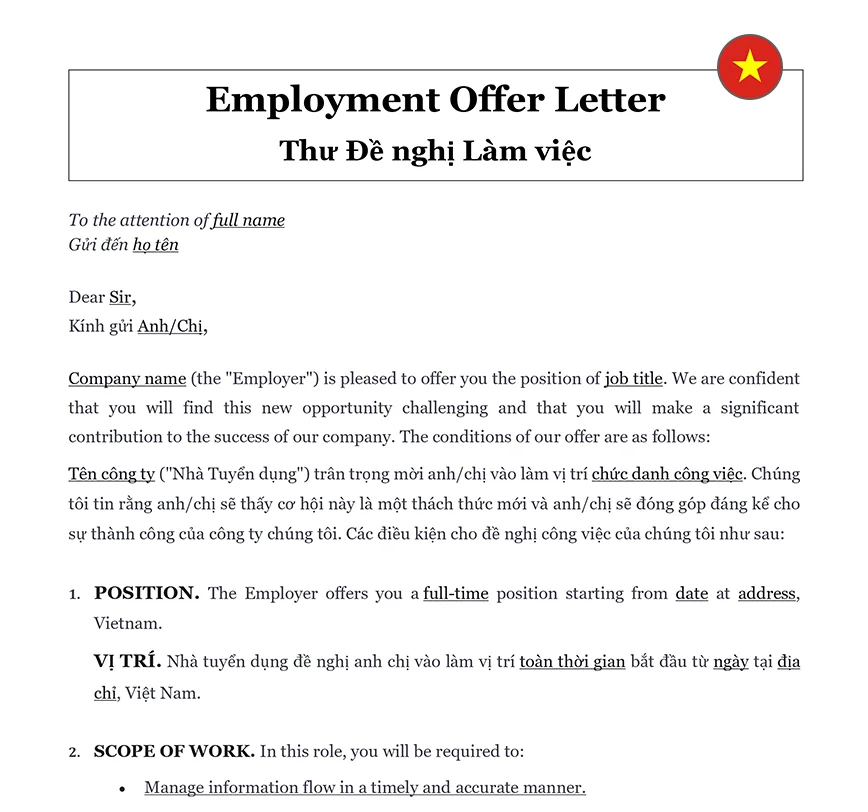Ready to use legal template
Work on without any hassle
Vietnamese-English translation
Ready to use legal template
Work on without any hassle
Vietnamese-English translation
Learn more about Employment Offer Letter in Vietnam
An Employment Offer Letter is a formal document issued by an employer to a selected candidate, outlining the key terms and conditions of their employment. It serves as the first step in establishing a clear and professional working relationship, detailing important aspects such as job position, salary, benefits, work schedule, and start date. In Vietnam, employment agreements must comply with the Labor Code of Vietnam, ensuring that employer-employee relationships are legally sound and mutually beneficial. Whether you are hiring local or foreign employees, having a professionally structured offer letter ensures clarity and legal compliance. Download our easy-to-edit Employment Offer Letter in Word format, expertly drafted in both English and Vietnamese, to streamline your hiring process and maintain a legally compliant and transparent employment relationship.
Table of contents
What is an Employment Offer Letter?
What is included in an Employment Offer Letter?
What are the different types of Employment Offer Letters?
How to deliver an Employment Offer Letter in Vietnam?
Can an Employment Offer Letter be negotiated in Vietnam?
How does an Employment Offer Letter differ from an Employment Contract?
Are there specific laws or regulations governing Employment Offer Letters?
What should foreign employees consider when receiving an offer letter?
What is an Employment Offer Letter?
An Employment Offer Letter is a crucial document in the hiring process, formally extending an offer of employment to a candidate. It serves as a written confirmation of the job position being offered, including essential details such as job title, start date, and compensation package. Additionally, the offer letter may outline any specific terms or conditions of employment, such as probationary periods or confidentiality agreements, providing clarity to both the employer and the candidate about the expectations and obligations associated with the role.
For the candidate, receiving an Employment Offer Letter is often the final step before officially joining a company, marking a significant milestone in their career journey. It not only formalizes the job offer but also demonstrates the employer’s commitment and interest in the candidate. Moreover, the offer letter serves as a reference point for both parties, helping to mitigate any potential misunderstandings or disputes regarding the terms of employment. Overall, an Employment Offer Letter plays a pivotal role in establishing the foundation of the employment relationship and setting the stage for a successful transition into the new role.
What is included in an Employment Offer Letter?
An Employment Offer Letter typically includes essential details such as:
1. Job Title: Clearly states the position being offered.
2. Start Date: Specifies the date when the candidate is expected to begin employment.
3. Compensation: Outlines the salary or hourly wage offered, along with any other forms of compensation such as bonuses or commission structures.
4. Benefits: Describes the employee benefits package, which may include health insurance, retirement plans, paid time off, and other perks.
5.Work Schedule: Specifies the regular work hours and any expectations regarding overtime or flexible scheduling.
6. Reporting Structure: Indicates who the employee will report to and their position within the organizational hierarchy.
7. Employment Status: Clarifies whether the position is full-time, part-time, temporary, or permanent.
8. Conditions of Employment: Outlines any specific terms or conditions that the employee must agree to, such as confidentiality agreements, non-compete clauses, or probationary periods.
9. At-Will Employment: States whether the employment relationship is “at-will,” meaning that either the employer or the employee can terminate the relationship at any time, with or without cause.
What are the different types of Employment Offer Letters?
Employment Offer Letters can vary based on factors such as the nature of the job, industry standards, and specific company policies. Here are some common types:
Standard Offer Letter: This is the most basic type of offer letter, typically including essential details such as job title, start date, compensation, and benefits.
Executive Offer Letter: Offer letters for executive-level positions often include additional perks and benefits, such as stock options, signing bonuses, and relocation assistance.
Conditional Offer Letter: Sometimes, an offer of employment is contingent upon certain conditions being met, such as passing a background check, drug test, or providing necessary documentation. Conditional offer letters outline these requirements.
Internship Offer Letter: Offer letters for internships may differ from standard employment offers and typically include details about the duration of the internship, responsibilities, and whether it’s paid or unpaid.
Themis Partner also offers a professionally crafted Internship Invitation Letter template designed to streamline the process of inviting interns to join your organization.
Part-Time Offer Letter: Offer letters for part-time positions outline the terms of employment for roles that require fewer hours than full-time positions, including prorated compensation and benefits.
Seasonal or Temporary Offer Letter: These offer letters are for positions that are temporary or seasonal in nature, such as holiday or summer jobs. They often specify the duration of employment and any seasonal benefits.
Remote Work Offer Letter: With the rise of remote work, offer letters for remote positions may include details about telecommuting arrangements, communication expectations, and technology support.
Promotion Offer Letter: When an employee is being promoted within the company, the offer letter may outline the new role, responsibilities, salary increase, and any additional benefits or perks associated with the promotion.
Independent Contractor Offer Letter: For contractors or freelancers, offer letters may be used to formalize the terms of a project-based engagement, including scope of work, payment terms, and deliverables.
Rejection Letters: While not technically an offer letter, rejection letters are also a type of communication related to employment offers, informing candidates that they have not been selected for a position.
How to deliver an Employment Offer Letter in Vietnam?
In Vietnam, delivering an Employment Offer Letter can be done through various methods, depending on the preference of the employer and the accessibility of the candidate. Here are some common methods:
| ➤ In Person: If feasible, the employer may opt to deliver the offer letter in person during a face-to-face meeting with the candidate. This allows for immediate communication and provides an opportunity for the employer to answer any questions the candidate may have. |
| ➤ Courier or Postal Service: The offer letter can be printed and mailed to the candidate's postal address using a reputable courier service or postal service. This method ensures that the candidate receives a physical copy of the offer letter, though it may take some time for delivery. |
| ➤ Email: Sending the offer letter via email is a quick and efficient method, especially for candidates who are in different locations or prefer digital communication. The letter can be attached as a PDF document or included in the body of the email, along with any instructions or additional documents. |
| ➤ Registered Mail: For added security and confirmation of receipt, the offer letter can be sent via registered mail, requiring the recipient to sign for delivery. This provides a level of assurance that the candidate has received the offer letter. |
| ➤ Online Platforms: Some employers may utilize online platforms or portals to deliver offer letters electronically. These platforms may require candidates to log in to view and accept the offer letter digitally, streamlining the process and reducing paperwork. |




